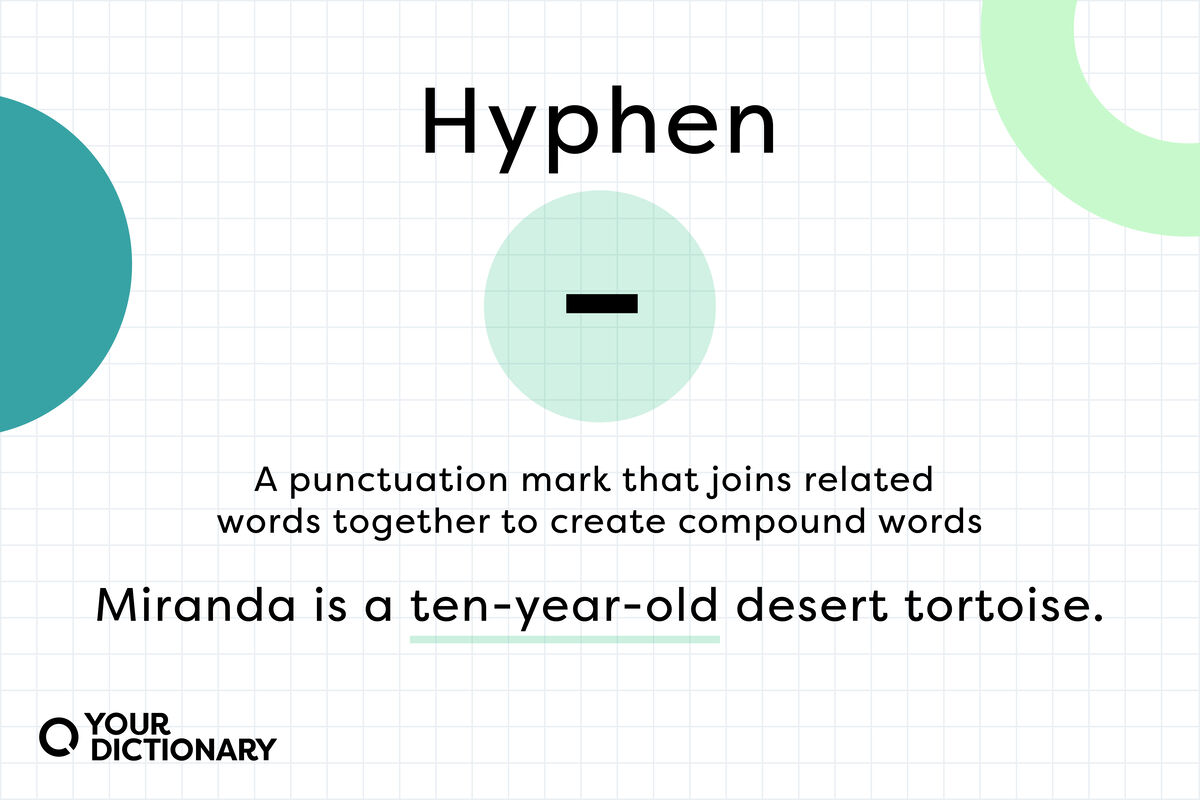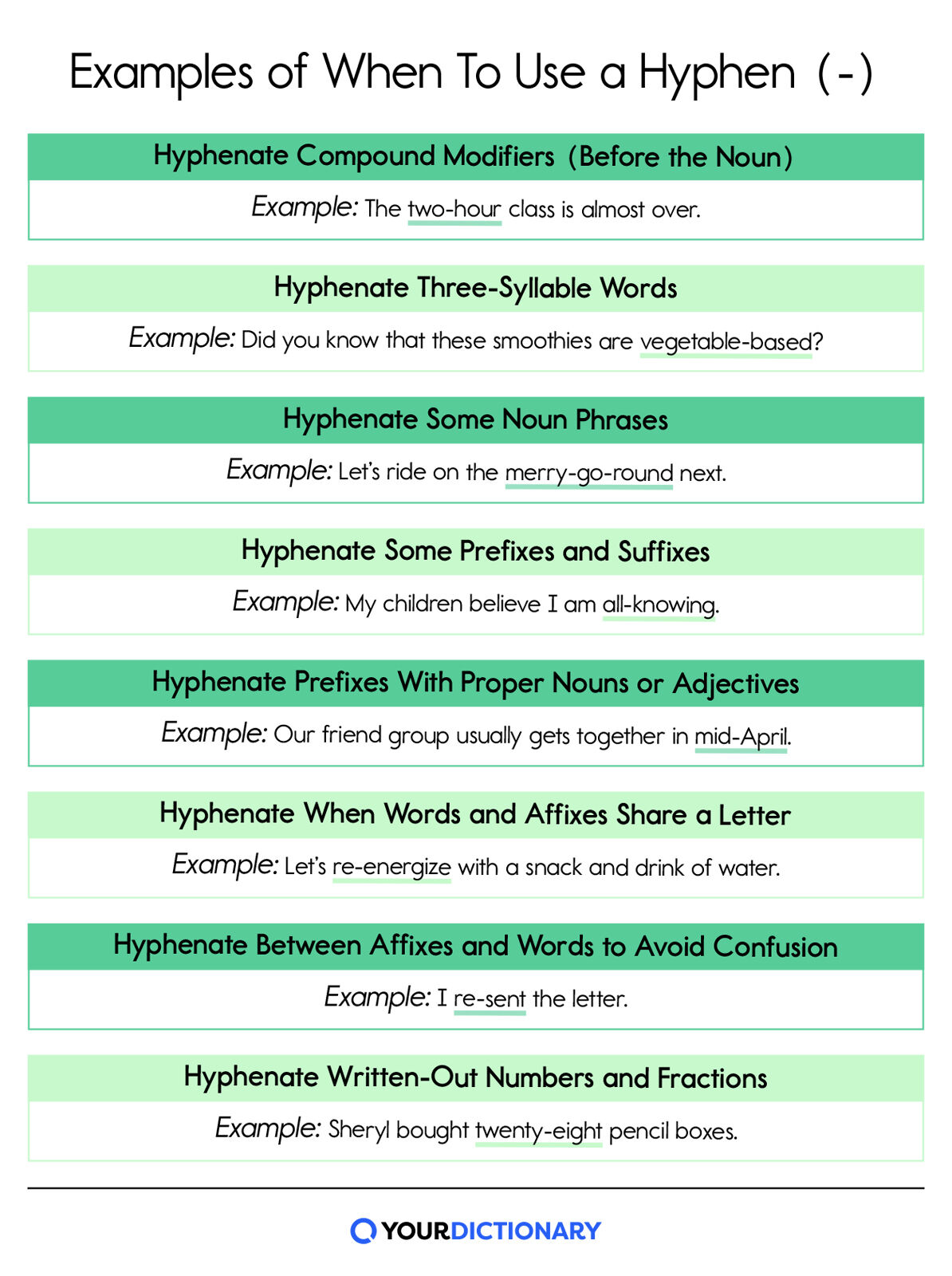
A hyphen (-) is a punctuation mark that joins related words together to create compound words like:
- follow-up
- up-to-date
- full-time (adjective only)
- father-in-law
- five-year-old
- sugar-free
It clarifies word meaning, forms new ideas, and allows writers to use language in a cool, creative way.
Hyphens can also indicate when a word is cut off, either at the end of a line or because someone stops speaking abruptly. (“Have you seen the pineapple mons-”)
So when is a hyphen actually necessary, when is it optional, and when don’t you need one at all?
When To Use a Hyphen
While some situations can include a hyphen, there are several occasions when you need to use a hyphen to be grammatically correct.
For example:
- to join two adjectives that come before a noun to show they are related
- to join prefixes and suffixes to a root word
- in written out numbers and fractions
- to clear up any confusion between similar words
Each of these cases is explained in more detail with examples below. Don't let that hyphen trick you.

How To Use a Hyphen in Compound Words
Combining two words makes a completely different word known as a compound word. Most compound words don’t need a hyphen, but in some cases, they do. For example:
|
Use a Hyphen |
Hyphen Examples |
|
when compound adjectives come before nouns |
grass-fed beef |
|
with compound words that aren’t combined |
editor-in-chief |
You may see these rules in sentences like:
- The two-hour class is almost over.
- It’s a good idea to avoid lead-based paints if possible.
- Recess became a free-for-all once it started raining.
- This article about healthy eating is a real eye-opener.
How To Use Hyphens with Prefixes and Suffixes
Most of the time, adding affixes to a word doesn’t require a hyphen. In some cases, however, it’s a good idea to hyphenate the prefix or suffix to its base word, including:
|
Use a Hyphen |
Hyphen Examples |
|
prefixes self-, all-, and ex- |
self-esteem |
|
prefixes and a noun that share a letter |
re-energize |
|
prefixes before proper nouns or adjectives |
un-American |
|
suffixes -elect and -odd |
mayor-elect |
|
suffixes with three-syllable nouns (or more) |
adobe-like |
|
when a noun and a suffix share a letter |
Moab-bound |
Examples of these hyphen rules in a sentence include:
- Bullying can negatively affect teenagers’ self-esteem. (Hyphenate self-)
- My children believe I am all-knowing. (Hyphenate all-)
- Do you know my ex-husband? (Hyphenate ex-)
- Let’s conduct a meta-analysis of the research. (Hyphenate when prefix and word share a letter)
- That is a beautiful pre-Raphaelite painting. (Hyphenate when prefix comes before a proper noun or adjective)
- There will be thirty-odd kids at the party. (Hyphenate suffix -odd)
- I love these restaurant-style tortilla chips. (Hyphenate suffix when noun has three or more syllables)
- The pitcher has a drip-proof lid. (Hyphenate when suffix and word share a letter)
Other Times To Use a Hyphen
You’ll want to use a hyphen in a few additional situations.
Compound numbers (numbers twenty-one to ninety-nine) and fractions always require hyphens when written out.
It’s also a good idea to include a hyphen when the unhyphenated version of the word is a completely different word (such as prefix, as in “a word placed in front of another” and pre-fix, as in “before a fix”).
|
Use a Hyphen |
Hyphen Examples |
|
with compound numbers (21-99) |
forty-seven |
|
with fractions (except one half) |
two-thirds |
|
to avoid confusion |
re-pair (to pair again, not “repair”) |
Examples of these hyphen rules in sentences include:
- The car was going fifty-five miles per hour. (Hyphenate compound numbers)
- Sheryl bought twenty-eight pencil boxes. (Hyphenate compound numbers)
- One-third of freshmen stayed in the dorms. (Hyphenate fractions)
- The kids ate three-quarters of the pizza. (Hyphenate fractions)
- I re-sent the letter. (Not resent)
- Most of the fans in the stadium are pro-State. (Not prostate)
Helpful Hack
You can find the hyphen symbol (-) on your keyboard, typically at the end of your number row near the zero (0) key.
When Not To Use a Hyphen
It seems like using a hyphen is often the safe choice in writing.
Generally, that’s true — although there are a few times when you shouldn’t use hyphens. These occasions include:
- when a compound adjective follows the noun (“the well-known artist” vs. “the artist is well known”
- when an adverb ending in -ly modifies a noun (“the happily singing children”)
- when using most prefixes or adjectives (countrywide, nondairy, untouched)
When To Use a Dash Instead of a Hyphen
Many people confuse hyphens and dashes because they look similar in printing. However, they serve very different purposes.
- Hyphens (-) connect words and parts of words, and aren’t separated by spaces.
- Dashes, (–) and (—), indicate ranges or pauses in writing, and are usually separated by spaces.
The common rule of thumb is to use a dash when showing a break in the text, a range in dates or time. Use a hyphen to create a connection between two words.
Fast Fact
The word hyphen comes from the Greek words hypo- (“under”) and -hen (“one”) — as in, connecting two separate words as one word.
Hyphens date all the way back to the second century B.C. when they were invented by Greek grammarian Dionysius Thrax. It was also one of the original punctuation marks included on a typewriter.